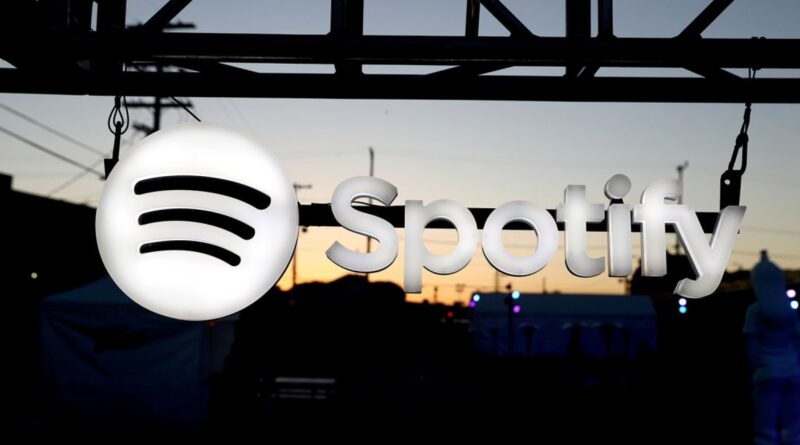White Supremacist Acts Are ‘Prevalent’ on Spotify, But the Streamer Says It’s Working On It
Spotify is vowing to remove racist, anti-semitic and other hate content from its platform following a new report that says music from a number of white supremacist acts is “prevalent” on the streaming service.
The report, published by the Anti-Defamation League (ADL) on Thursday (Sept. 22), found a total of 40 white supremacist acts hosted on Spotify, violating the platform’s rules against “dangerous content.” According to the report, “extremist” musical sub-genres encompassed by these artists include Fashwave, electronic music that espouses white supremacist ideology; Rock Against Communism, a sub-genre of punk that promotes racism and antisemitism; and National Socialist Black Metal (NBSM), a sub-genre of metal that espouses fascism and white supremacy.
The ADL noted that several of these acts — many of which it says shared links to “other extremist spaces” directly in their profiles — are “verified” artists on Spotify, giving them license to use the service’s built-in tools to help surface their music on playlists (the verification process is automatic once an artist claims their profile via the Spotify for Artists portal.) To cite one example, the report claimed that a keyword search on Spotify for the term “Fashwave” alone turned up a total of 72 playlists created by Spotify users, with titles including 14/88 (a white supremacist code) and Right Wing Death Squad. It also highlights instances of Spotify-generated algorithmic playlists curated for individual users that incorporate white supremacist content.
In February 2022, the ADL published a separate report that found Spotify’s platform rules were lacking and “loosely defined,” leading Spotify to update those rules to add “a much more explicit anti-extremism policy,” according to the new report. But the organization alleges those rules “do not appear to be strictly enforced” and notes that users wishing to flag such content can only do so on the Spotify desktop app, with the mobile version lacking similar functionality. (Spotify confirms it’s working on adding a reporting method to the mobile app.)
“Despite adding explicit anti-extremist guidelines to their content policy, Spotify allows extremist content to flourish,” the Sept. 22 report reads. “Between the extremist content found in some artists’ bios, the white supremacist messaging in some band’s lyrics and the white supremacist imagery found in the cover art, Spotify still has considerable work to do in implementing its new policy.”
Spotify’s current platform rules prohibit content “that incites violence or hatred towards a person or group of people based on race, religion, gender identity or expression, sex, ethnicity, nationality, sexual orientation, veteran status, age, disability or other characteristics associated with systemic discrimination or marginalization.” This includes “praising, supporting, or calling for violence against a person or group of people based on the characteristics listed above”; “dehumanizing statements about a person or group based on the protected characteristics listed above”; and “promoting or glorifying hate groups and their associated images, and/or symbols.”
In a statement to Billboard regarding the ADL report, a Spotify spokesperson says the company “takes content concerns very seriously, and we leverage a variety of algorithmic and human detection measures to ensure that all of the content on our platform is in keeping with our Platform Rules.” These measures include a team of in-house “experts” that “regularly reviews and takes action against violative content on our platform.”
Since Jan. 1, the spokesperson claims that over 12,000 podcast episodes, 19,000 playlists, 160 music tracks and nearly 20 albums that violate Spotify’s policies against hate content globally have been removed, including “much of the content” referenced in the most recent ADL report. But Billboard‘s own search on Monday (Sept. 26) found multiple playlists labeled “Fashwave,” “Rock Against Communism” and “NBSM,” as well as the music of acts mentioned in the report, including IronMensch, Elessar, OBNX, Kushfrost and Mayhem. In response, Spotify says its teams “reviewed all of” the content flagged by ADL and “took action on those that violated” its platform rules.
“We recognize that even with our continued innovation and investments when it comes to moderation, there is always more work to be done,” the spokesperson added. “For this reason, we established the Spotify Safety Advisory Council to help ensure our policies, enforcement mechanisms, and partnerships address the needs of our community of global users, creators, and artists. We also remain open to engaging in a dialogue with organizations, including the ADL, so that we might benefit from their expertise and continue to improve the safety of our platform.”
Established in June, the Spotify Safety Advisory Council includes individuals and organizations who have been tasked with helping the platform “evolve its policies and products in a safe way while making sure we respect creator expression,” according to a press release at the time. “Our council members will advise our teams in key areas like policy and safety-feature development as well as guide our approach to equity, impact, and academic research,” though they do not make enforcement decisions about specific content or creators. Founding members and partner organizations on the council include the Dangerous Speech Project, represented by professor Susan Benesch and Tonei Glavinic; the Center for Democracy and Technology, represented by Emma Llansó; and the USC Annenberg Inclusion Initiative, represented by Dr. Katherine Pieper and Dr. Stacy L. Smith.
The problem of hate content isn’t new to Spotify. In 2017, the company removed a number of white supremacist acts that had been designated as racist “hate bands” by the Southern Poverty Law Center after a Digital Music News investigation turned up more than two dozen on the platform. And while the ADL report specifically targets Spotify — a prominent target given its status as the largest music streaming service globally — it’s not the only platform that has been criticized for hosting hate content. In 2020, a BBC investigation found “racist, anti-Semitic and homophobic content” hosted on multiple services, including Spotify, Apple Music, YouTube Music and Deezer, leading all four companies to take steps to remove it.

